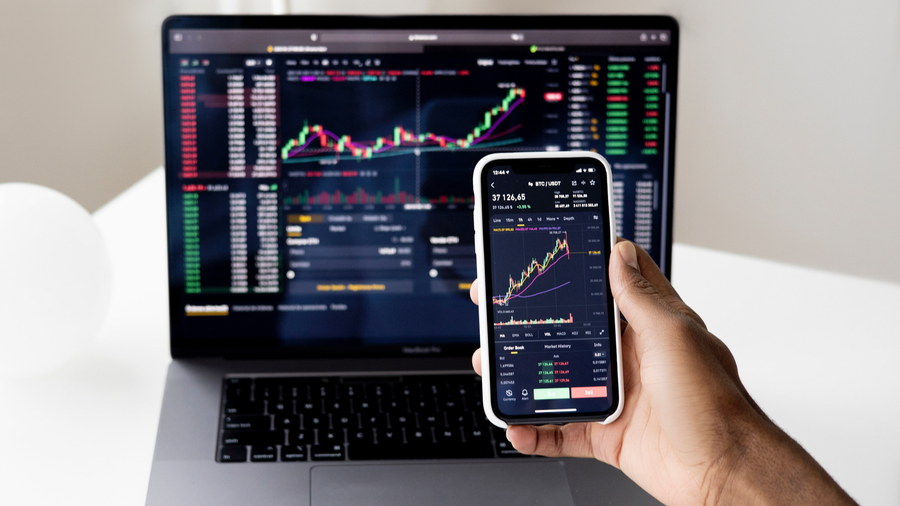
ETF (Exchange-Traded Fund) investing has been popular with investors for many years, and for obvious reasons. They offer an easy and relatively low-risk way for investors to participate in the financial markets, allowing them to invest in multiple asset classes and track entire sectors at the same time with only one position open.
Finding the right ETF broker is essential because it can potentially impact your investment returns, the range of investment options you will be able to invest in, and the level of guidance you can receive.
When it comes to choosing an ETF broker, the best type of broker is one that can meet each individual trader’s needs and preferences. This means that there is no one-size-fits-all when it comes to brokers, and two traders may not find the same one as appealing.
In this guide, we will provide a step-by-step approach to finding the best ETF broker that works for your needs and can increase your chances of maximising your returns on your investment journey.
Determine your trading needs and preferences
The first step to choosing the best ETF broker for you is to understand what you need. This means determining what your preferences and requirements, such as your risk appetite, your preferred instruments in which to invest, and how much you can invest. Remember that there are no guarantees of profits in the world of investment regardless of the financial market you participate in, so you should ideally only invest what you can reasonably afford to lose.
Research brokers thoroughly
Once you have determined your trading parameters, it becomes much easier to find a broker or ETF provider that can meet those needs and filter out those that do not. On your journey of researching brokers, you should consider the following factors.
Product availability and fee structure
Your first step is finding a broker that caters to you geographically and offers the ETFs and other investment products you want to invest in. A broker, no matter how perfect in trading infrastructure and fees, will not be your ideal investment partner if they do not offer the exact ETFs you want to invest in.
Fee and account structure
Next, you should consider the fees and account structures offered to you by the broker. Many of them provide tiers of accounts for investors of different backgrounds and experience levels. These account tiers may offer different spreads, operational fees, and a sliding scale commission. You want to find one that matches your trading needs depending on how frequently you will trade, how much capital you will trade, and what your trading strategy may be.
Regulation of the broker
You should also consider the regulation of these brokers. All brokers that operate in the financial sphere should be properly authorised to do so, so that your funds can receive the security they deserve. For example, in Australia, all brokers must be licensed by the ASIC, while in Hong Kong, all brokers must be regulated by the SFC, and in the UK, all brokers must be licensed by the FCA.
Trading platform offered
Additionally, think about the trading platform offered by the broker. Many of them have bespoke solutions that offer superior trading environments, but brokers that partner with MetaTrader to provide the services of the popular MT4 and MT5 platforms can give you a great level of comfort as well.
Research and educational resources
Many brokers provide in-house research such as daily market updates and educational resources in the form of investment guides, product guides, and courses on trading strategies. If you want to hone your skills continually in the course of your investment journey, working with a broker that can provide these resources is a good way to do so for free. You may also be able to sign up for market updates sent to your email or to your phone, so that you can always stay ahead of the markets.
Level of customer support
Finally, take a look at the level of customer support a broker can afford and their response rate and efficiency. Consider the ways you can contact the broker and the level fo support they can afford – in terms of technical, account, and trading guidance and problem-solving. You can find most of this information on the broker’s website and in the form of reviews left by other users online.
What to do after finding the right broker
When you have found the best broker for you, this does not mean you should stop levelling up your skills or stop looking for resources to deepen your expertise as an ETF trader. Below are some things you can do to make sure you are always on top of the markets.
Understand how ETF trading works
Of course, choosing the right broker for you is only half the battle. You should have a thorough understanding of how ETF trading works, and why you are investing in ETFs instead of in any other asset classes and products. Understand the benefits ETF trading can bring as well as the risks and limitations of this product. Then, you can go about minimising and mitigating these risks.
Set clear investment goals
When investing in ETFs, the most important thing you should do is to set clear goals and parameters for yourself. Understand what you want to achieve with your ETF investment, be it maintaining your wealth or growing it. Do you want to amass money in the short term or do you want to build your portfolio in the long term? Understanding what you want to achieve can help you select a suitable ETF for you.
Learn as much as you can about your chosen ETF
When you have selected an ETF, you should know what drives its price movements by examining the sector it tracks and the overall economy. Stay up to date with interest rates, inflation rates, and the performance of the overall stock market. You should also learn about the trading times of the ETF and its historical price fluctuations to get a better handle on how you plan to invest in the asset.
Stay informed
Finally, you should continue to stay informed about the market by keeping a close eye on the ETF’s developments after you have entered the market. You should make sure you have an exit strategy in case of things going awry, and you should never invest with more than you can afford to lose. Stay informed of what other investors are doing, industry trends at large, and regularly review your ETF investing strategy.
Conclusion
Finding the right ETF broker for you is essential if you want to increase your chances of having a successful investment journey. When choosing a broker, the first thing you must do is consider your own investment needs and preferences, which can set a foundation and a baseline for the broker you choose and those you filter out. Be sure to take a comprehensive approach and make sure they are regulated in your region. Only through doing your due diligence will you be able to find the best ETF broker for yourself in both the short and long term. When you have found the best broker for you, do not forget to keep yourself informed of how ETF trading works and monitor the markets closely to increase your chances of invesment success.



